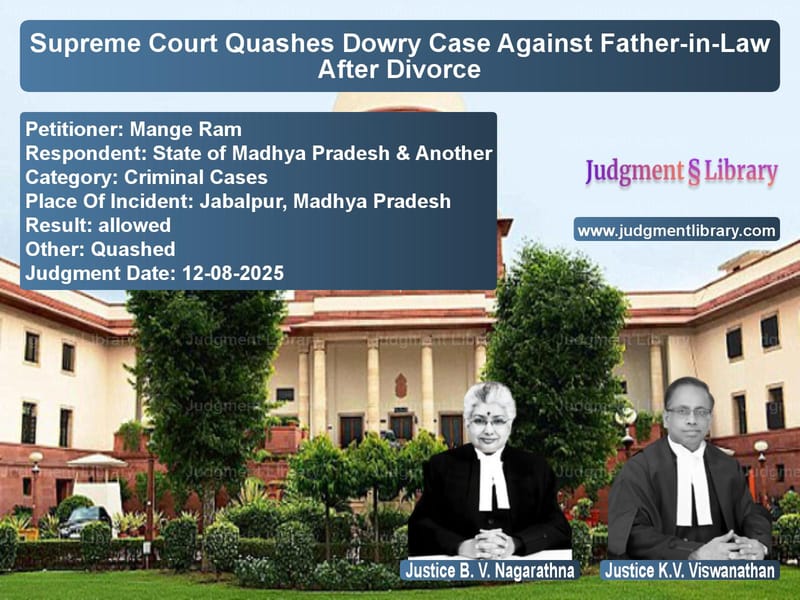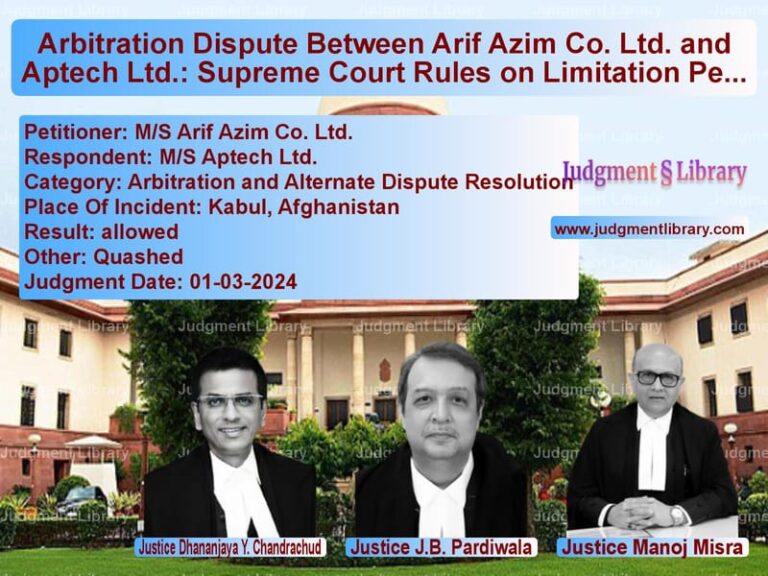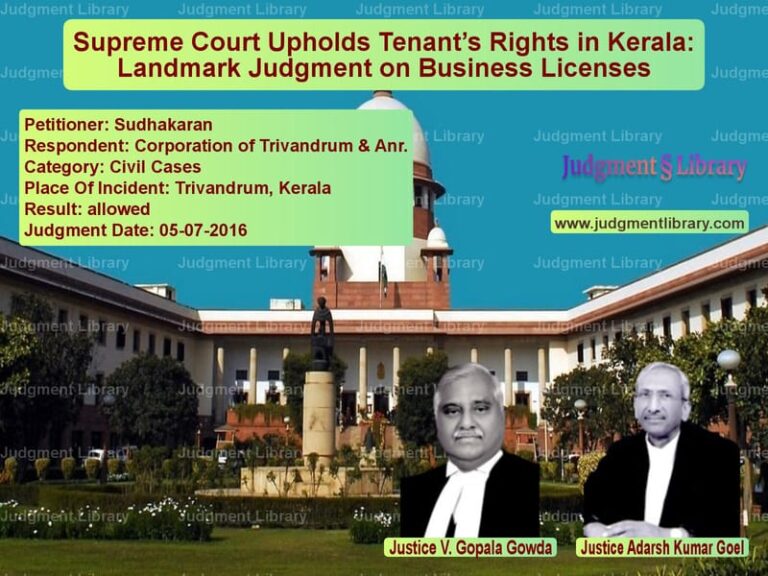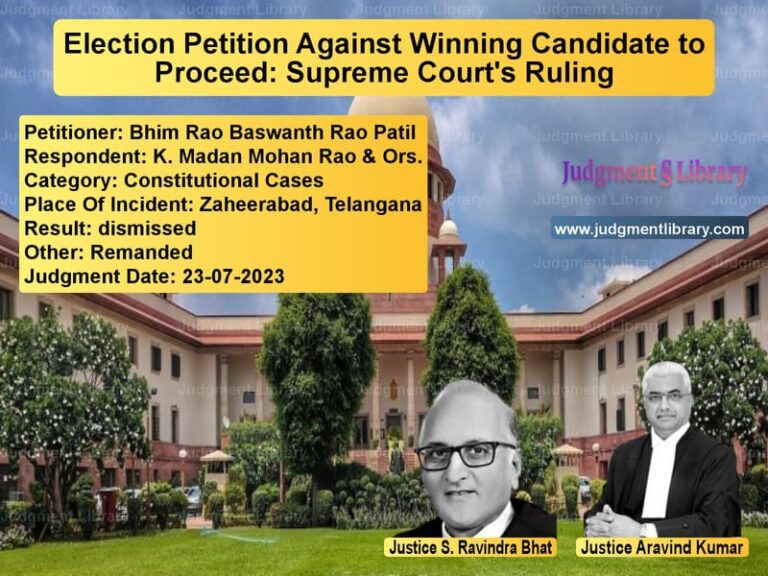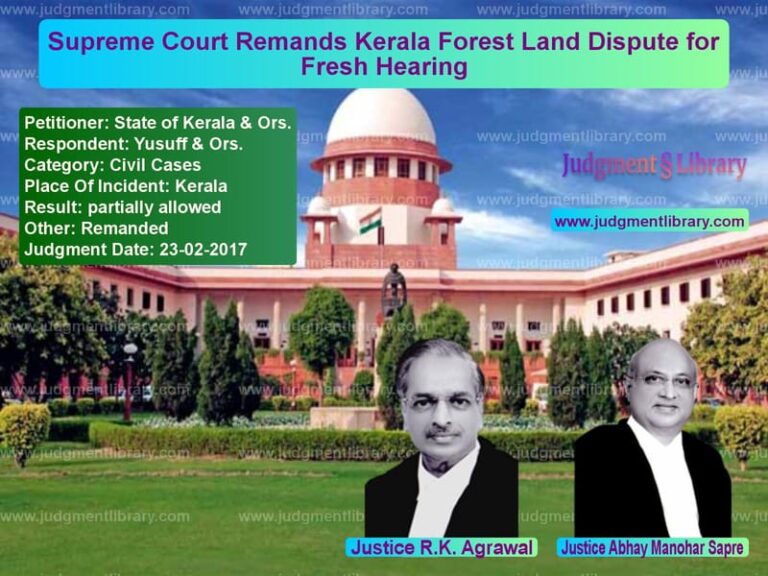Supreme Court Quashes Dowry Case Against Father-in-Law After Divorce
In a significant ruling that addresses the growing concern about misuse of dowry laws, the Supreme Court of India has quashed criminal proceedings against a father-in-law, emphasizing that family members should not be unnecessarily roped into matrimonial disputes. The judgment comes as a relief to many families who have faced the threat of criminal prosecution long after marriages have ended and parties have moved on with their lives. The case highlights the delicate balance between protecting women from genuine harassment and preventing the misuse of legal provisions as instruments of vengeance.
The legal battle began when Mange Ram, the appellant and father-in-law of the complainant, approached the Supreme Court challenging the Madhya Pradesh High Court’s decision that refused to quash criminal proceedings against him. The case had its origins in a marriage that took place in December 2017 between the appellant’s son and the second respondent through the Special Marriage Act. What began as a digital acquaintance through a matrimonial website soon turned into a legal nightmare for the elderly father-in-law, who found himself facing serious criminal charges including dowry demands and physical assault.
The Allegations and Initial Proceedings
The complainant had alleged that soon after counselling sessions at the Mahila Police Station in Jabalpur, fresh demands were made by the appellant and his wife, including a sum of Rupees five lakhs in cash, gold ornaments, a motor car, clothing, and other customary articles. The most serious allegation claimed that the appellant had called respondent No.2 to Jabalpur Railway Station, where he publicly admonished her, slapped her, and threatened to ruin her life, expressing his displeasure at having been summoned to the police station. It was further alleged that he reiterated the dowry demand, which, according to the complainant, was subsequently enhanced to Rupees ten lakhs.
Based on these allegations, FIR No.58 of 2019 was registered at Mahila Police Station, Jabalpur, naming the husband, father-in-law (appellant), mother-in-law and sister-in-law as accused under Sections 498A and 34 of the Indian Penal Code and Sections 3 and 4 of the Dowry Prohibition Act. The charge sheet was filed on 18.08.2019, and the matter was pending before the Court of the Judicial Magistrate First Class at Jabalpur.
The Appellant’s Arguments
Learned counsel for the appellant made several compelling arguments challenging the validity and timing of the FIR. He submitted that the filing of FIR No.58 of 2019, dated 21.07.2019, by respondent No.2 was nothing but a counterblast, intended to pressurise the appellant’s son and his family, and constituted an abuse of the process of law. Drawing our attention to the nature of allegations, it was submitted that respondent No.2 had alleged that the appellant demanded a sum of Rs.5 lakhs by way of dowry and had slapped her on 02.06.2019. However, no complaint or grievance was raised immediately thereafter. The FIR, it was pointed out, came to be lodged only after respondent No.2 received summons in the divorce proceedings.
The appellant’s counsel further contended that if such an incident had in fact occurred on 02.06.2019, respondent No.2 would have raised it during the counselling session held at the Mahila Police Station, Jabalpur, where both parties were present. It was urged that the absence of any such complaint at the relevant time renders the allegation baseless and motivated.
It was further submitted that the criminal proceedings have been initiated by respondent No.2 solely with the intent to extort money from appellant’s son, who is stated to have paid substantial sums both prior to and after the marriage. Learned counsel also drew our attention to the fact that the High Court, by the very same impugned order, had quashed the proceedings as against the mother-in-law and sister-in-law of respondent No.2, yet declined to extend similar relief to the appellant, who stands on an identical footing, being the father-in-law.
The State’s Counter-Arguments
Per contra, learned counsel appearing for respondent No.1-State opposed the prayer for quashing and submitted that the FIR contains specific and detailed allegations not only against the appellant but also against his son. It was submitted that the appellant is alleged to have demanded a sum of Rs.5 lakhs towards dowry at the time of marriage, along with other items, including gold ornaments and a motor vehicle. The said demand is further alleged to have been subsequently increased to Rs.10 lakhs.
Learned counsel further submitted that the FIR contains allegations of physical assault and wrongful confinement of the complainant and that her mobile phone was allegedly taken away by appellant’s son, thereby preventing her from contacting her family. It was next submitted that specific incident is alleged to have taken place at Jabalpur Railway Station, wherein the appellant is said to have slapped the complainant and issued threats.
The State’s counsel also relied on the statements of five witnesses cited in the chargesheet, including two brothers of the complainant-respondent No.2 herein, who are stated to have supported the allegations. It was submitted that the High Court, upon due consideration of the material on record, rightly declined to quash the proceedings as against the appellant and his son, while granting relief to the other co-accused in respect of whom no specific role was attributed.
The Supreme Court’s Analysis
The Supreme Court, comprising Justices B.V. Nagarathna and K.V. Viswanathan, conducted a thorough examination of the facts and legal principles involved. The court noted several crucial aspects that weighed in favor of quashing the proceedings against the appellant.
The court observed that A bare perusal of the FIR and the materials placed on record reveals that the specific allegation against the appellant is that, on 02.06.2019, he slapped the complainant at Jabalpur Railway Station, reiterated a demand for dowry in the sum of Rs.5 lakhs, and threatened to ruin her life. However, the FIR came to be registered only on 21.07.2019. It appears to this Court that the FIR lodged by respondent No.2 is highly belated and is not free from doubt.
The court made a significant observation about the timing of the FIR and the conduct of the parties: The complainant is stated to have left the matrimonial home on 15.05.2019 and returned to her parental residence. Thereafter, both parties were summoned to the Mahila Police Station, Jabalpur, for counselling. Sessions were held on 26.05.2019 and 02.06.2019, attended by the appellant’s son and members of both families. Notably, there is no material to indicate that any allegation of physical assault or dowry demand by the appellant was raised by the complainant during these sessions. On the contrary, the record indicates that the counselling held on 02.06.2019 culminated in a mutual understanding that the parties would remarry in accordance with Hindu rites within two months. This conduct is wholly irreconcilable with the allegations that were subsequently made.
The court emphasized the importance of the fact that the marriage had already ended through divorce: It is not in dispute that the appellant’s son and respondent No.2 have since parted ways pursuant to the decree of divorce dated 24.08.2021 which has attained finality. Once the marital relationship between the principal parties stands legally dissolved, the continuation of criminal proceedings arising out of the discord of that relationship serves little purpose. The appellant before us is the father-in-law of respondent No.2. With the marriage of appellant’s son and respondent No.2 having come to an end, the continuation of proceedings against the appellant would neither advance the cause of justice nor serve any practical purpose. On the contrary, it would only perpetuate hostility between the parties who appear to have otherwise moved on with their lives.
Legal Principles and Precedents
The Supreme Court relied on several important precedents to support its decision. The court referred to Dara Lakshmi Narayana vs. State of Telangana, where it was made clear that family members of the husband ought not to be unnecessarily roped into criminal proceedings arising out of matrimonial discord. The Court observed that it has become a recurring tendency to implicate every member of the husband’s family, irrespective of their role or actual involvement, merely because a dispute has arisen between the spouses. It was further held that where the allegations are bereft of specific particulars, and particularly where the relatives sought to be prosecuted are residing separately or have had no connection with the matrimonial home, allowing the prosecution to proceed would amount to an abuse of the process of law. The Court noted that criminal law is not to be deployed as an instrument of harassment, and that judicial scrutiny must be exercised to guard against such misuse.
The court also cited Mala Kar vs. State of Uttarakhand and Arun Jain vs. State of NCT of Delhi, where it had quashed criminal proceedings arising out of matrimonial discord after the parties had divorced. The reasoning adopted therein applies with equal force to the facts of the present case.
In Gian Singh vs. State of Punjab, this Court observed that where the High Court quashes a criminal proceeding having regard to the fact that the dispute between the offender and the victim has been settled, although the offences are not compoundable, it does so as in its opinion, continuation of criminal proceedings will be an exercise in futility and justice in the case demands that the dispute between the parties is put to an end and peace is restored, securing the ends of justice being the ultimate guiding factor. In this regard, a specific reference was made to offences arising out of matrimony, particularly relating to dowry, etc. or a family dispute, where the wrong is basically to the victim but the offender and the victim have settled all disputes between them amicably, irrespective of the fact that such offences have not been made compoundable.
The Court’s Final Ruling
In the considered opinion of this Court, the power under Article 142 must be invoked to advance the cause of complete justice in matters of this nature. Once the marital relationship has ended in divorce and the parties have moved on with their lives, the continuation of criminal proceedings against family members, especially in the absence of specific and proximate allegations, serves no legitimate purpose. It only prolongs bitterness and burdens the criminal justice system with disputes that are no longer live. The law must be applied in a manner that balances the need to address genuine grievances with the equally important duty to prevent its misuse. In appropriate cases, the power to quash such proceedings is essential to uphold fairness and bring about a quietus to personal disputes that have run their course.
Accordingly, in order to do complete justice between the parties, this Court deems it appropriate to invoke its powers under Article 142 of the Constitution of India. The court allowed the appeal and set aside the order passed by the High Court. Consequently, FIR No.58 of 2019 registered at Mahila Police Station, Jabalpur, dated 21.07.2019, under Sections 498A and 34 of the IPC and Sections 3 and 4 of the Dowry Act, as well as the charge sheet dated 18.08.2019 filed before the Court of the Judicial Magistrate First Class, Jabalpur against the appellant herein, are hereby quashed.
This judgment serves as an important reminder that while laws against dowry and cruelty are essential for protecting women’s rights, they should not be misused to harass family members, especially when the marital relationship has ended and parties have moved on with their lives. The Supreme Court’s decision reinforces the principle that justice must balance the need to address genuine grievances with the prevention of misuse of legal processes.
Petitioner Name: Mange Ram.Respondent Name: State of Madhya Pradesh & Another.Judgment By: Justice B. V. Nagarathna, Justice K.V. Viswanathan.Place Of Incident: Jabalpur, Madhya Pradesh.Judgment Date: 12-08-2025.Result: allowed.
Don’t miss out on the full details! Download the complete judgment in PDF format below and gain valuable insights instantly!
Download Judgment: mange-ram-vs-state-of-madhya-prad-supreme-court-of-india-judgment-dated-12-08-2025.pdf
Directly Download Judgment: Directly download this Judgment
See all petitions in Dowry Cases
See all petitions in Domestic Violence
See all petitions in Criminal Defamation
See all petitions in Fraud and Forgery
See all petitions in Legal Malpractice
See all petitions in Judgment by B.V. Nagarathna
See all petitions in Judgment by K.V. Viswanathan
See all petitions in allowed
See all petitions in Quashed
See all petitions in supreme court of India judgments August 2025
See all petitions in 2025 judgments
See all posts in Criminal Cases Category
See all allowed petitions in Criminal Cases Category
See all Dismissed petitions in Criminal Cases Category
See all partially allowed petitions in Criminal Cases Category

